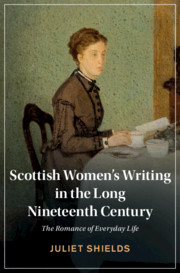Book contents
- Scottish Women’s Writing in the Long Nineteenth Century
- Cambridge Studies in Nineteenth‐Century Literature And Culture
- Scottish Women’s Writing in the Long Nineteenth Century
- Copyright page
- Contents
- Acknowledgments
- Introduction
- Chapter 1 Oliphant, Scott, and the Novelist’s Trade
- Chapter 2 Annie S. Swan’s Friendly Fiction
- Chapter 3 The Scottish New Woman and the Art of Self-Sacrifice
- Chapter 4 The Colonial Adventure Story and the Return of Romance
- Chapter 5 Scottish Modernism and Middlebrow Aesthetics
- Conclusion
- Bibliography
- Index
- Cambridge Studies in Nineteenth-Century Literature and Culture
Introduction
The Scottish Novel after Scott
Published online by Cambridge University Press: 27 July 2021
- Scottish Women’s Writing in the Long Nineteenth Century
- Cambridge Studies in Nineteenth‐Century Literature And Culture
- Scottish Women’s Writing in the Long Nineteenth Century
- Copyright page
- Contents
- Acknowledgments
- Introduction
- Chapter 1 Oliphant, Scott, and the Novelist’s Trade
- Chapter 2 Annie S. Swan’s Friendly Fiction
- Chapter 3 The Scottish New Woman and the Art of Self-Sacrifice
- Chapter 4 The Colonial Adventure Story and the Return of Romance
- Chapter 5 Scottish Modernism and Middlebrow Aesthetics
- Conclusion
- Bibliography
- Index
- Cambridge Studies in Nineteenth-Century Literature and Culture
Summary
Introduction: Walter Scott’s tales of chivalry and adventure inaugurated a masculinized Scottish romance tradition that celebrated a sublime and heroic version of Scotland. Nineteenth-century Scotswomen responded to Scott’s influence by establishing a countertradition of unromantic or even antiromantic representations of Scotland. Their novels challenge the long-standing claim that Scotland lacked any equivalent to the English realist novel. In turning from the past to the present and from the sublimity of Scott’s Highland landscapes to farmhouses, factories, and suburban villas, Scottish women writers brought romance to everyday life, illuminating the magnificence of the mundane. Drawing on the evangelical discourses emerging from the splintering of the Presbyterian Church in 1843, they represented fiction as a form of spiritual comfort, an antidote to the dreary monotony and petty frustrations of daily existence.
Keywords
- Type
- Chapter
- Information
- Scottish Women's Writing in the Long Nineteenth CenturyThe Romance of Everyday Life, pp. 1 - 32Publisher: Cambridge University PressPrint publication year: 2021



